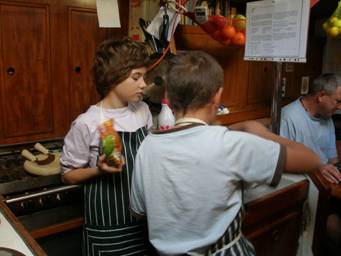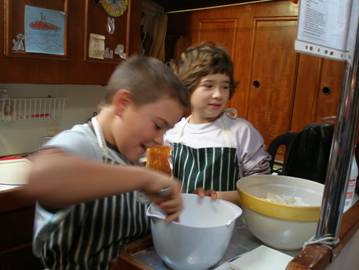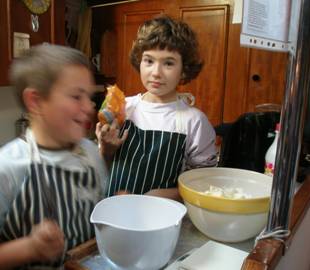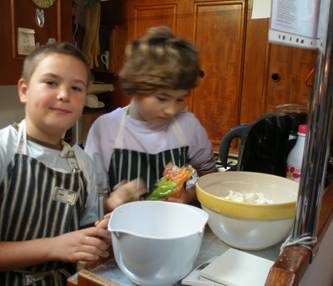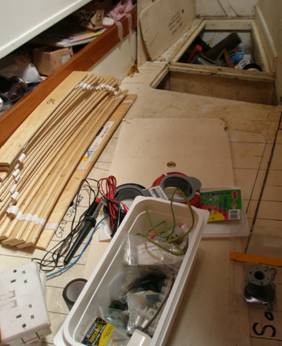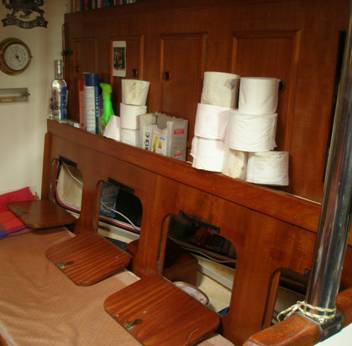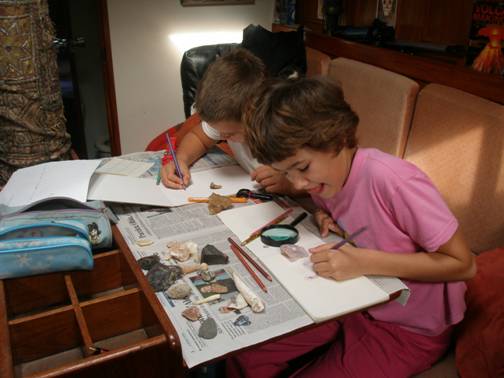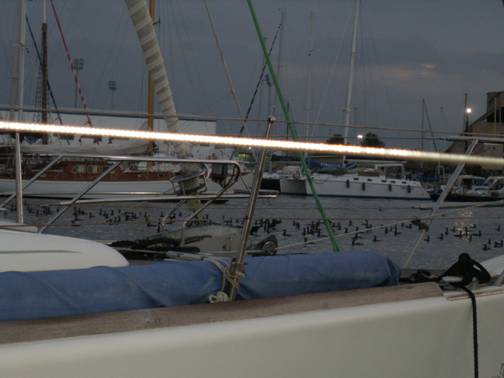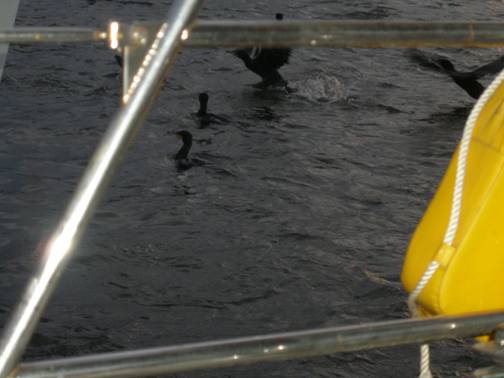A bunch of shaggers and other collective nouns

|
Curries and Welsh
cakes To break the
monotony of the sub-arctic Sardinian winter, Gary and Julia (WILD OATS), Rosie
and Otwin (ENYA) and Lynne (MOYA) came across to Watch
She eventually put them down long enough to do some cooking!
“I think it needs some more sultanas, Mummy.” Thanks for the T-bags,
Alan! Stephen and Anne
brought their visitors, Alan and Nigel, to meet us and to have a glass of wine
on board Eau de holding
tank On the boat jobs, David moved our ceiling mounted DVD/CD/radio/TV player from the saloon into the forepeak (Bryn's cabin in the pointy end), so that the children can shut themselves in and watch DVDs or listen to CDs without disturbing us (or vice versa). The ‘should-only-take-a-couple-of-hours’ job to run the wires, of course, involved emptying lots of lockers, and then evolved. We emptied Beth’s cabin to get at the new wire, and the starboard lockers in the saloon, the notorious holding tank cupboard behind the loo, and Bryn’s toy and clothes locker to run the new wires through.
Beth’s cabin stripped out to get at the new wire – this is before David even started to empty the rest of the boat! You can see the offending wires running through the starboard lockers in the saloon. He did eventually run them through a conduit and didn’t leave them loose for me to pull out by accident when I do a spot of locker rearrangement. As it was raining, all the stuff out of the lockers ended up under our feet in the saloon.
Don’t you just love a clear and orderly workspace? Spot the new box of T-bags. Once we had emptied the holding tank cupboard, it became obvious that the cork lining the hull inside the cupboard was retaining some of the odour (eau de holding tank) from past loo pump stripping incidents. We decided that the only way to get rid of the smell was to strip off the cork lining – a perfect job for little people armed with sharp tools, bent on destruction. Meanwhile we dried out our loo roll collection (which had got damp with condensation from lying against the hull), and David got on with fitting the offending DVD player. Once the cupboard had been stripped, washed down, dried and passed the sniff test, we eventually put back all the bed linen and towels and wedged everything in with freshly dried loo rolls. The rest of the day was spent repacking lockers while Beth and Bryn tested the DVD function on the player. Geology and marine
biology We have been to
a couple of lectures on geology and marina biology – given by
Our lecture theatre and lecturers. Valentina is a
geologist and she talked about the geology of
Testing the limestone stalactite with hydrochloric acid; no HSE out here – it’s all hands on schooling! These lectures – as you can imagine – have been great school fodder. The children have identified all of the 'magic' stones that we have on board (doesn’t everyone have a ‘magic’ stone collection?), and we have been brushing up on plate tectonics on the internet. John – and Wendy – you’d be proud of us!
The ‘magic’ stones being identified, sketched, and catalogued ready to be stored away in a plastic box for future reference.
Techno-school: internet-based schooling has become a family affair now that we can all see the screen (I must remember to remove empty vodka bottles before taking photos for the blog). Next week we
will be learning how to identify marine mammals, and the geology of The I often get up before David and the children, to work while it’s quiet. One morning, just as it was getting light, I heard really loud splashing and went out to investigate. The water in the marina was full of cormorants. There were literally hundreds of them – in a feeding frenzy. Every 5 minutes or so they would all take off, circle the marina in the eerie half-light, and splash land to feed again.
The
A duck dive of cormorants fishing close to the boat. I did a bit of research and found out that, while we refer to them as cormorants, the birds we are seeing might actually be European Shags. Looking up the collective nouns was more fun, and I came up with the expected flight of cormorants, but also a gulp, a “lett fli”, a paddling, and a swim of cormorants, and a hangout of shags. In Wales cormorants are often known as bilidowcars (billy duckers), and, combining a bit of word association, observation on how they enter the water to fish, and poetic licence, I would like to propose a new collective noun – a duck dive of cormorants. David’s suggestions were a dive of shags and a bunch of shaggers. Nothing unexpected there then… |
